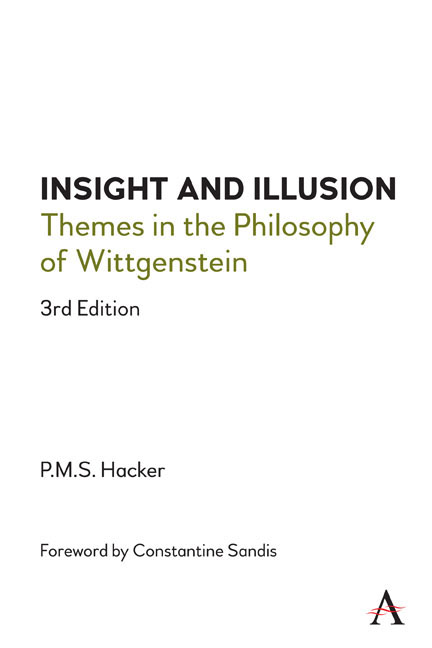Book contents
- Frontmatter
- Dedication
- Contents
- FOREWORD
- PREFACE TO THE REVISED EDITION
- PREFACE TO THE FIRST EDITION
- LIST OF ABBREVIATIONS
- I WITTGENSTEIN’S EARLY CONCEPTION OF PHILOSOPHY
- II THE DIALOGUE WITH FREGE AND RUSSELL
- III MEANING, METAPHYSICS, AND THE MIND
- IV EMPIRICAL REALISM AND TRANSCENDENTAL SOLIPSISM
- V DISINTEGRATION AND RECONSTRUCTION
- VI WITTGENSTEIN’S LATER CONCEPTION OF PHILOSOPHY
- VII METAPHYSICS AS THE SHADOW OF GRAMMAR
- VIII THE REFUTATION OF SOLIPSISM
- IX PRIVATE LINGUISTS AND PUBLIC SPEAKERS
- X ‘A CLOUD OF PHILOSOPHY CONDENSED INTO A DROP OF GRAMMAR’
- XI CRITERIA, REALISM AND ANTI-REALISM
- INDEX
IV - EMPIRICAL REALISM AND TRANSCENDENTAL SOLIPSISM
Published online by Cambridge University Press: 24 February 2022
- Frontmatter
- Dedication
- Contents
- FOREWORD
- PREFACE TO THE REVISED EDITION
- PREFACE TO THE FIRST EDITION
- LIST OF ABBREVIATIONS
- I WITTGENSTEIN’S EARLY CONCEPTION OF PHILOSOPHY
- II THE DIALOGUE WITH FREGE AND RUSSELL
- III MEANING, METAPHYSICS, AND THE MIND
- IV EMPIRICAL REALISM AND TRANSCENDENTAL SOLIPSISM
- V DISINTEGRATION AND RECONSTRUCTION
- VI WITTGENSTEIN’S LATER CONCEPTION OF PHILOSOPHY
- VII METAPHYSICS AS THE SHADOW OF GRAMMAR
- VIII THE REFUTATION OF SOLIPSISM
- IX PRIVATE LINGUISTS AND PUBLIC SPEAKERS
- X ‘A CLOUD OF PHILOSOPHY CONDENSED INTO A DROP OF GRAMMAR’
- XI CRITERIA, REALISM AND ANTI-REALISM
- INDEX
Summary
The Self of Solipsism
The discussion of the metaphysical doctrines of the Tractatuswould be incomplete without an examination of the oracular remarks in the 5.6's on solipsism and the self. These belong (in Kantian terms) to the ‘metaphysics of experience'. The fundamental contention of the section is that there is a sense in which solipsism is true, ‘what the solipsist meansis quite correct; only it cannot be said,but makes itself manifest [es zeigt sich] (TLP,5.62). In the sense in which solipsism is true, however, the expression of it coincides with pure realism (TLP,5.64). The obscure argument supporting these claims rests upon two struts. First, it rests upon considerations of the relationship of language, the world, and the self; secondly, upon the analysis of the relations between the concepts of the knowing self, the empirical self, and the metaphysical self. The task of this chapter is to explore these relationships.
First, was Wittgenstein in any sense, a solipsist? If he was, then one must explain how a strictly thought-out solipsism coincides with realism. Secondly, the connections between any solipsistic views in the 5.6's and the rest of the Tractatusmust be examined to see whether the putative solipsism follows from the account of language and meaning given in the book. These are the immediate purposes of the following discussion. One of the primary means to attain them will consist in a detailed comparison of some of Wittgenstein's doctrines with those of Schopenhauer from whom they are derived. This will not only throw light upon the Tractatusbut will also serve a more long-term objective. This is to show that the detailed refutation of solipsism and of idealism, which Wittgenstein produced in the 1930s and incorporated, in low key, in the Investigations,is directed inter aliaagainst views which he himself held as a young man. The Schopenhauerian influence upon Wittgenstein is most prominent in the Notebooks 1914-16,where his idealist and solipsist bent is most readily demonstrable. Thus even if the explanations I shall suggest of the Tractatussolipsism are incorrect, the latter purpose will be satisfactorily fulfilled if the explanations of the Schopenhauerian sections of the Notebooksare correct.
- Type
- Chapter
- Information
- Insight and IllusionThemes in the Philosophy of Wittgenstein, pp. 81 - 107Publisher: Anthem PressPrint publication year: 2021

